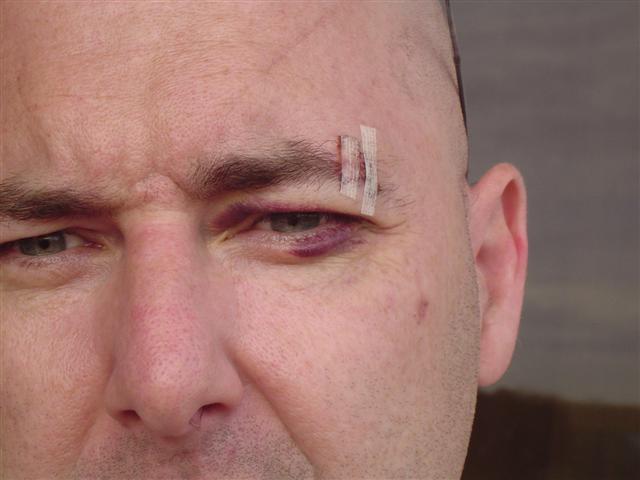
when an american moves to a muslim country they are confronted with many differences in social culture. the lack of pork and alcohol, the inclusion of sharia law into the court system are large for americans who are taught that "pork fat rules", going out with friends includes buying a round of drinks and that society works because of a separation of church and state. in the US everyone is entitled to the same freedoms, the first of which is exercise of their religious beliefs. moving to a culture where the majority are ruled with one set of laws and the minorities another is unsettling.
when i first came to malaysia, one of the first pieces of advice i had was given was to not shake hands with women if they were wearing a tudung. i was told that women in tudung were more conservative and would not touch a man's hand. people were surprised that i came to this country and began to drive immediately. they thought moving from left-hand drive to right would be difficult for me; it took me about an hour to make the transition. but, they assumed not sticking my hand out towards someone would be easy; it took me many months to make that transition.
about a year after coming here, a women i knew began to wear tudung because she had gotten married and her husband "requested" she appear more proper. my impression was that her bright and shiny glow was filtered by this new screen between her and the world. her full expressions were now only visible in private, in public she was more shielded. it was explained as a choice she made, but it was clearly a choice based on "request" more than desire.
there were other women i met in tudung, and later met outside of it. some were women who wore tudung in certain settings and not others. i came to realize the social pressures to be covered were not just from husbands, but also that families, bosses and peers who also had expectations of proper behavior. for some the pressure to conform required them to be covered in one setting but allowed them to be open away from those pressures. i was amazed at the amount of angst someone could go through simply in choosing to let their hair down.
i received an email this week, it had a picture of a little girl in the next car. she was in a pretty pink tudung and looked happy to have the morning sun on her face. the subject line of the email was "poor child", an indictment of the parents who would force a child this young to become separated from the world. rather than questioning the wearing of tudung, the image of the child almost hanging out the window of a car in traffic, had me wondering why she was not in a seat belt.
last week, an expat friend of mine made a comment about tudung, it was in the form of a question, "why would anyone want to do this?". i surprised myself by answering in defense of the tudung. i have asked the question many times, some women have shyly looked at me and said "i have to". other, smart and capable women have given me deeper answers; thoughtful and considered. it was clear they were making a choice for themselves. as a libertarian i am ready to respect and defend someone for making a choice, even if it differs from the one i would make.
in the past 4 years i have learned to see beyond the veil. moving from the view that tudung was a misogynistic form of control, to one that respects the choice a woman can make to declare to the world that she wishes to keep more of herself private. this change of view is one that i am honestly surprised by, and one that would not have happened if women did not choose to answer my questions openly.
malay women used to begin to wear tudung as they aged, they would be 40ish when they put the it on. the trend over the past 25 years has been to begin wearing it younger and younger. it should be possible for the 40 year old women to make a choice; but a small child has no choice. good parents make choices for their children, they set expectations and impose limits. i do not allow my children to rollerblade without helmet and wrist guards. i question why some parents would teach their daughters that scarfs come before seat belts.
protecting my children from high speed crashes comes close to first in my priorities of parenting, allowing them the room for self expression and choice closely follows. for malaysians i can only hope that choice of coverage is given to each as an individual. as i have learned, women who have real choice are those who can later explain why it is important to them. enforcement of rules without allowing choice leads those who can to rebellion, even if that rebellion is in the form of quiet hypocrisy. for those who can't think, following rules is not a victory, because thought is required for choice.
i have changed since moving here. i still believe in the evil tirade of pork, beer and secularism, but i can now defend something i used to see as oppressive.
but, only when being closed was an open choice.











I was in the midst of sharpening my claws when I read para 3 about how some women wore the tudung due to requests and not desire and wondered what type of pathetic tudung women you’ve met to give such a lame answer but your para on how some women wore the tudung to keep more of herself private redeemed you (a tad). For me, wearing the tudung was a conscious choice I made. It’s a part of my identity and a declaration to the world: “Look I respect myself enough to keep myself private”. Just like how some non-believers felt that Muslim women who wore the tudung are conservative and restricted, we, practicing Muslim women too wondered why some women choose to dress like sluts and then wondered why men don’t treat them with respect.
ReplyDelete~ tudung women you met in Bali~
the other way to look at this is ...
ReplyDeletewhy are women not respected unless they cover themselves? women should be respected for whether they are in bikini or burqa. they should have freedom of choice in all things in life, just as men should. why should a woman not be safe at all times?
identity is another thing. visible signs of group identity are core to group cohesion. if wearing a t-shirt, carrying an LV bag or waving a flag allows you to make a statement, you should be free to do it. wearing a star, cross or scarf are the same, just a different group identity.
someone might even choose to tattoo themselves, or not to, both could be concise choices to declare themselves inside or outside a group. embracing a group, especially if someone felt as though they were an outsider inside their preferred group, could be shown with visible signs... i am thinking about gang-bangers with neck tattoos -- but anything that shows someone is "good" or "real" would be the same.
Ah, the key word there is “should”. You mentioned that women should be respected no matter what they wore. But are they? Reality and idealism are separated by a vast ocean of ‘ifs’ and ‘shoulds’.
ReplyDeleteAlong with respect, let me also introduce the word modesty (defined by Dictionary.com as “regard for decency of behavior, speech, dress, etc.”) Culture, upbringing, and gender biases however resulted in a marked difference to the definition of decency. To me, decency and modesty are the common factors leading to respect.
Agreed on the point of identity. But why is it no one questions if someone carries an LV bag (I prefer prada actually), wears a star, a cross or whatsoever but people questions (sometimes rather bluntly) when a Muslim lady wears jeans, long-sleeved shirt and tudung on a beach and she gets mauled and goes through extensive security checks at the airport when her non-tudung friends of the same faith were allowed to stroll past unchecked? The other day, I read a Facebook post of a Muslim guy friend who was put through extreme airport checks simply on the basis of his name which carries a ‘Muhammad’ at the front coupled with his few weeks old beard. Why is it an American or European with the same beard was allowed to go through the same airport unchecked or with less stringent checks? That’s the reality of the prejudices surrounding our religion.
So excuse us if we are a tad defensive. The tudung may cover our modesty, but it does not cover our minds, our humanity, our intelligence, nor our rights to express our identity without the shroud of prejudices.